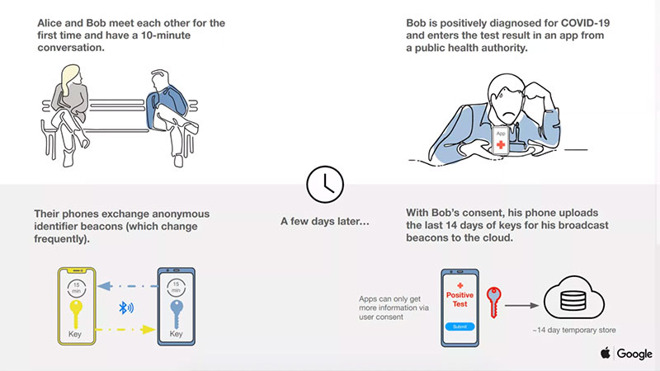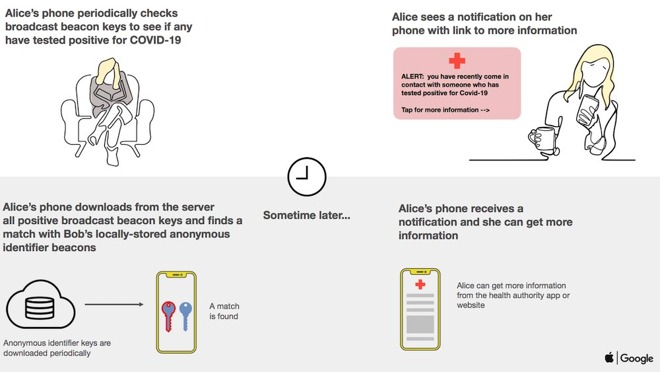EU to pressure Tim Cook about privacy in Apple & Google's COVID-19 contact tracing
Regulators in Brussels have already talked with Google about the risks to privacy of its COVID-19 contract-tracing app, and are going to meet with Apple's Tim Cook over the same issues.

Illustration of the contact tracing solution.
Apple's collaboration with Google over a coronavirus contact tracing app is causing concern within the European Union, which is now pressing both companies to abide by EU privacy restrictions. Specifically, Thierry Breton, the European Union's single market commissioner, has said that Brussels will be scrutinizing how the service is rolled out.
According to the Financial Times, the EU's digital agency DG Connect will assess potential risks to privacy before Apple and Google's system can be introduced there.
"Contact tracing apps can be useful to limit the spread of the coronavirus," said Breton. "But their development and interoperability need to fully respect our values and privacy."
Breton has yet to speak with Tim Cook, although a meeting is scheduled, but he has had a half hour teleconference with Google. "I had a good and constructive exchange with [CEO] Sundar Pichai on this important matter," he said.
The EU is in the process of implementing a wide-ranging digital strategy, and has what it refers to as a "toolbox" which mandates when and how contact tracing can or cannot be allowed.
Bretton is pressing both Google and Apple to confirm that they will abide by this EU toolbox. Reportedly, Google's Pinchai has said the company will adhere to the EU's requirements even as it is "racing" to develop the system with Apple.
The system is to be a series of APIs that will allow iPhones and Android phones to help identify the spread of the virus through tracing the contacts that people have in daily life. Apple and Google gave as an example of how a person diagnosed with COVID-19 could allow his or her phone to upload details of who they have been in contact with. It would work by the people's phones exchanging information over Bluetooth.
Even as the two companies announced the plan for them to work together on this, privacy was foremost on Apple's mind. "Contact tracing can help slow the spread of COVID-19," said Tim Cook in a tweet, " and can be done without compromising user privacy."

An illustration of how and when users will receive a notification from the system.
As well as the EU's concerns, though, the app has been singled out by President Trump for praise but also unspecified constitutional concerns. And Senator Richard Blumenthal (D-CT) has said Apple and Google must "convince a rightfully skeptical public" about the security of the app.
Consequently, both Apple and Google have responded to concerns by elaborating on their plans. They explained that the data will be used solely by public health organizations, and that at every stage the system was being created on principles of "privacy, transparency, and user control."
Apple's collaboration with Google over this COVID-19 app follows its working with the CDC to create an app and website for public use, and also its assisting Stanford Medicine's first-responder screening tool.

Illustration of the contact tracing solution.
Apple's collaboration with Google over a coronavirus contact tracing app is causing concern within the European Union, which is now pressing both companies to abide by EU privacy restrictions. Specifically, Thierry Breton, the European Union's single market commissioner, has said that Brussels will be scrutinizing how the service is rolled out.
According to the Financial Times, the EU's digital agency DG Connect will assess potential risks to privacy before Apple and Google's system can be introduced there.
"Contact tracing apps can be useful to limit the spread of the coronavirus," said Breton. "But their development and interoperability need to fully respect our values and privacy."
Breton has yet to speak with Tim Cook, although a meeting is scheduled, but he has had a half hour teleconference with Google. "I had a good and constructive exchange with [CEO] Sundar Pichai on this important matter," he said.
The EU is in the process of implementing a wide-ranging digital strategy, and has what it refers to as a "toolbox" which mandates when and how contact tracing can or cannot be allowed.
Bretton is pressing both Google and Apple to confirm that they will abide by this EU toolbox. Reportedly, Google's Pinchai has said the company will adhere to the EU's requirements even as it is "racing" to develop the system with Apple.
The system is to be a series of APIs that will allow iPhones and Android phones to help identify the spread of the virus through tracing the contacts that people have in daily life. Apple and Google gave as an example of how a person diagnosed with COVID-19 could allow his or her phone to upload details of who they have been in contact with. It would work by the people's phones exchanging information over Bluetooth.
Even as the two companies announced the plan for them to work together on this, privacy was foremost on Apple's mind. "Contact tracing can help slow the spread of COVID-19," said Tim Cook in a tweet, " and can be done without compromising user privacy."

An illustration of how and when users will receive a notification from the system.
As well as the EU's concerns, though, the app has been singled out by President Trump for praise but also unspecified constitutional concerns. And Senator Richard Blumenthal (D-CT) has said Apple and Google must "convince a rightfully skeptical public" about the security of the app.
Consequently, both Apple and Google have responded to concerns by elaborating on their plans. They explained that the data will be used solely by public health organizations, and that at every stage the system was being created on principles of "privacy, transparency, and user control."
Apple's collaboration with Google over this COVID-19 app follows its working with the CDC to create an app and website for public use, and also its assisting Stanford Medicine's first-responder screening tool.

Comments
Apple should have been honest and said "we shouldn't trust Google, because they make their money from your data" and opted out from an agreement. This is what I miss about Steve.
like the ones both Apple and Google use.
The law involved was hammered out over a very long time and is seen as a model for other similar protections elsewhere.
Assuring compliance with legislation is an absolute must.
Specifically, they don’t like that Apple and Google’s system decentralizes data by keeping it on individual users phones. They would rather have all the data centralized in a single database that belongs to them.
I’m frequently hearing a criticism from ‘experts’ quoted in the media that fear the system could be trolled. Something along the lines of ‘little Johnny doesn’t want to go to school so he tells the app he is COVID-19 positive and the whole school gets shut down for weeks’. The fact is that the API is designed to be incorporated into apps built by local health authorities. The local health authorities will be responsible for entering or confirming positive test results.
Thankfully if you’re suicidal you can opt out.
smfh
Apple recently released a tool offering Mobility Trends reports that show changes in people’s commuting movements following social distancing guidelines. They generate the results using data collected through the Apple Maps app. The daily reports reveal the travel data of people driving, walking, and utilizing public transport since January this year based on location history from the use of your iPhone and millions of others. It's available for 63 countries too. Google's similar tool covers 180.